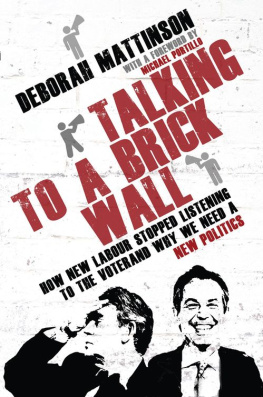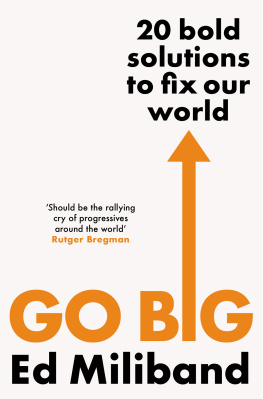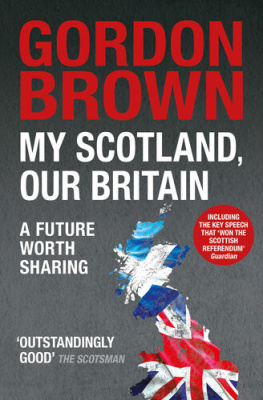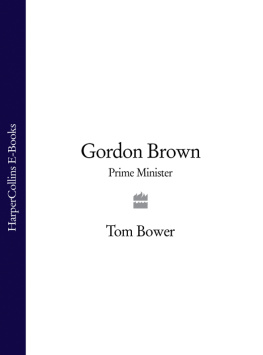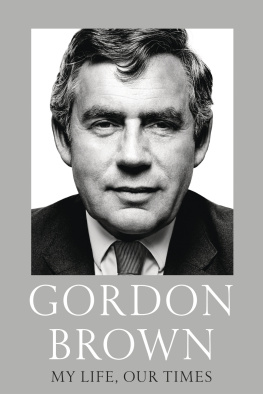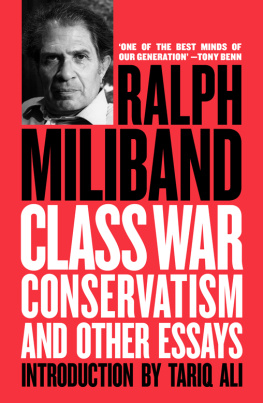For Want of a Paragraph
Tom Black
This is a work of fiction . While a sense of realism has been sought, all characterisations were developed with the primary aim of telling a compelling story.
All rights reserved.
Primrose Hill Monday 28 July 2008
With a series of soft clicks, David Miliband stopped writing. Then, with a single, harder click, he deleted the sentence hed just finished. Another dud.
He rubbed his eyes and drained the last of his coffee, making a face as a couple of grounds got stuck in his teeth. Louise had made it for him just before she went to bed, and judging by its temperature, that must have been more than an hour ago. A glance at the bottom of the computer screen told him it was half past midnight.
The Guardian needed the article by 4:30am at the latest, apparently. Well, he was on track for that, at least. The piece had theoretically been finished for two hours. He just wasnt anywhere near happy with it. Why? With a sigh, David highlighted the last sentence.
So lets stop feeling sorry for ourselves, enjoy a break, and then find the confidence to make our case afresh.
Weedy, mealy-mouthed bollocks. The whole piece was an expertly crafted assassination attempt. The tribute to Labour history was an expert display of shinning over a perimeter fence. The tactical acknowledgment of New Labours missteps was a flawless pair of karate chops to the necks of unsuspecting bodyguards. The lengthy condemnation of Cameron kept all eyes on the distraction in the courtyard while Miliband clambered up a drainpipe - and entered a second floor window with a casual reference to reforming the NHS. The bold rhetoric on the task of government - and of modernising Labour - was the final few steps towards the bedroom of his target, neatly snapping the neck of a sleeping guard dog on the way.
But now, pistol raised, target acquired and all other threats eliminated, those final, lily-livered words were the equivalent of dropping the gun, giving Gordon a cheery wave, and saying well, see you next week.
It wasnt good enough. There was so much more to convey - and it could be done explicitly. Couldnt it? A dagger had traditionally been wielded from more auspicious places than Comment Is Free, admittedly. The green benches, the Tea Rooms, even the Admiralty. All were more appropriate backdrops for a bloodless coup. Aside from giving Alan Rusbridger a hard-on (and Polly Toynbee an aneurysm), was this really the right way to do it?
He knew roughly what hed say instead of that awful conclusion. He even had some turns of phrase ready. But all evening hed been telling himself hed get round to writing it, but his fingers just wouldnt do it.
Is this a laptop I see before me? he muttered.
His Shakespearean musings were interrupted by the pulsing of his BlackBerry. It started turning in circles on the desk, and the screen lit up. Reaching for it, David realised who it was from.
R we on? James Purnell had written.
Short and to the point, but with a hint of excitement. Typical James. Purnell had always given David the impression of a man in politics out of a desire to re-enact scenes from The West Wing - even before the programme had aired, David mused, recalling their mid-90s heyday as SpAds.
Picking up the phone, David pondered how exactly to respond. He, James and the others had gamed out the various paths that could be taken. The most broadly favoured was the one his article currently trod - write a rhetorically strong, barnburning speech in column form, but make no reference to Gordon, or his leadership. Then hit the sofas, make lots of noises about change, and hope the groundswell of support was enough to push the Caledonian Mafia onto their collective swords at conference in September.
Except, as James had passionately argued, that wouldnt work. The Broons had waited ten years for power - four of them in a state of bitterness unseen since Ted Heath died - and the idea that some fighting words in an Islington fishwrapper would frighten them into submission was pure poppycock. James had used stronger words than that, and David himself had needed to step in and calm the conversation down. Patricias dining room was not to be treated as the floor of the Commons. With James fuming but silent, his proposed path - a mass-resignation kicked off by an explicitly critical column - was talked out of play by the rest of the team. It was too risky, too bold, and wouldnt play well with a Westminster village already on its collective way to the summer holidays.
The BlackBerry stared back at Miliband, his reply to Purnell still pointedly blank. Not for the first time, David wished he could call Tony. His guidance - along with Alistairs - could be gold dust at this point. But Tony was strictly off-limits these days, that had been agreed. Aside from the probability that he didnt give a shit about Westminster now that he was zipping back and forth between D.C. and the Middle East, there was still - incredibly - a tiny risk that he would not look kindly on their little scheme. Not out of any great love for Gordon - goodness, no. But Tony was a man forged in the fires of the great schisms of Labour. He had seen what division did to the party, and what that, in turn, did for its opponents. His was a leadership defined by fanatical unity and loyalty at any cost: to rely on Tony not to blab everything to Gordon - via an intermediary, presumably - was too great a gamble to take.
Still... what would Tony do? David closed his eyes and tried to channel the spirit of Labours greatest helmsman. In particular, he focused on the young man who had, on learning of John Smiths death, set in motion the events that would culminate in The Deal, his election, and 97. Trying his hardest not to feel silly, David filled his mind with New Labour buzzwords, Blairite thoughts, and famous catchphrases. Were on the same side, were on the same team didnt seem particularly appropriate, and Education, education, education was straining a little hard for relevance, but...
David opened his eyes. If James plan was too violent, but the consensus plan was too timid, there was one, clear answer. Another option. A middle ground. A different way. A third way.
In the next room, a drowsy Louise rolled over and put a pillow over her ears. The soft clicks of Davids typing had become very loud indeed.
BBC Westminster Thursday 31 July 2008
No, Andrew, I dont mind saying it: its time for David Miliband to put up or shut up.
Andrew Neil gave a cheeky raise of the eyebrows to the camera and swivelled his chair.
Strong words from Diane. Michael? Your thoughts?
Portillo cleared his throat before speaking, which Andrew strongly suspected was an attempt to buy him a few moments time to think.
I think, what were seeing here, began Portillo, is the inevitable free-fall of the Blair-Brown project. The Great Leader finally got into power, but the Party has realised he wasnt all he was cracked up to be.
Diane Abbott frowned in that way that only she could, and put a hand firmly on Michaels arm.
Im sorry, but this is nonsense. Gordon Brown is a fine leader, and hes governing this country-
-without the support of his foreign secretary, interjected Andrew.
Thats not true, Andrew, and you know it, Diane protested. Andrew winked, and spun his chair again.
Another Labour firebrand - with a famous mum, no less - has put together his thoughts for us on this weeks battle of the column inches. Heres Dan Hodges.
The producer signalled they were out, and the studios TV began displaying Dan Hodges face as the Labour blogger paced around a cheap-looking casino.
...this week, David Miliband came very close to putting his cards on the table, Hodges said, leaning on a poker table and throwing some chips at the camera. Andrew chuckled.
But, Hodges face said from the screen as he inspected a hand of cards, should he instead have gone all-in?
Next page

